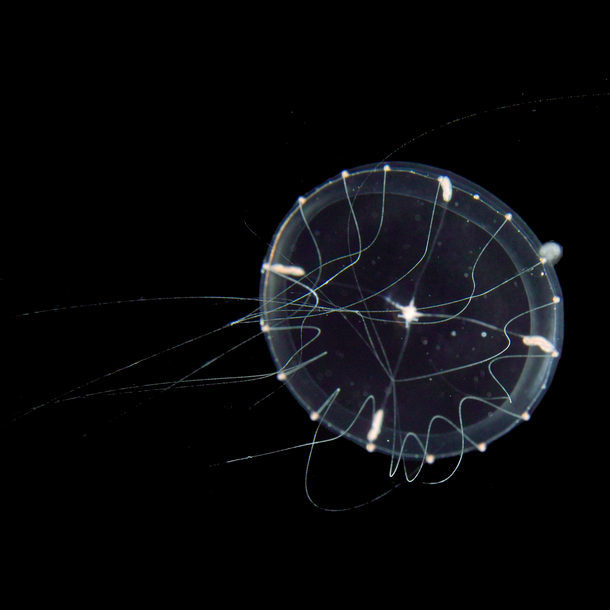
Clytia hemisphaerica (Jellyfish, Z4C2) Assembly and Gene Annotation
About Clytia hemisphaerica
Clytia hemisphaerica is a hydrozoan–group cnidarian with both a colonial, vegetatively propagating polyp stage and free-living, sexual medusae. The evolutionary interest of the medusa lies in many complex features including striated muscle and sense organs that are absent in the polyp. In recent years, Clytia has helped answer questions including regulation of oocyte maturation, origins of embryo polarity and evolution of Hox genes and striated muscle.[1,2]
Picture credit: Marion Lechable and Alexandre Jan, Laboratoire de Biologie du Développement de Villefranche-sur-mer [2]
Assembly
The Clytia hemisphaerica (strain Z4C2) genome was sequenced and assembled by the MARIMBA (Marine Invertebrate Models Database) project.
The assembly was imported from GenBank.
Annotation
The Clytia hemisphaerica gene models were provided as GFF3 file by the MARIMBA (Marine Invertebrate Models Database) project. Non-coding RNA genes were added with the Ensembl Genomes RNA gene annotation pipeline.
References
Clytia hemisphaerica MARIMBA page. Marine Invertebrate Models Database (accessed October 9, 2020)
The genome of the jellyfish Clytia hemisphaerica and the evolution of the cnidarian life-cycle. Leclère L, Horin C, Chevalier S, Lapébie P, Dru P, Peron S, Jager M, Condamine T, Pottin K, Romano S, Steger J, Sinigaglia C, Barreau C, Quiroga Artigas G, Ruggiero A, Fourrage C, Kraus JEM, Poulain J, Aury JM, Wincker P, Quéinnec E, Technau U, Manuel M, Momose T, Houliston E, Copley RR. Nat Ecol Evol. 2019 May;3(5):801-810. doi: 10.1038/s41559-019-0833-2.
Picture credit: Marion Lechable and Alexandre Jan, Laboratoire de Biologie du Développement de Villefranche-sur-mer [2]
Statistics
Summary
| Assembly | Clytia_hemisphaerica_genome_assembly, INSDC Assembly GCA_902728285.1, |
| Database version | 115.1 |
| Golden Path Length | 420,978,673 |
| Genebuild by | Institut de la Mer de Villefranche |
| Genebuild method | Import |
| Data source | Institut de la Mer de Villefranche |
Gene counts
| Coding genes | 19,132 |
| Non coding genes | 2,771 |
| Small non coding genes | 2,771 |
| Gene transcripts | 28,666 |



![Follow us on Twitter! [twitter logo]](/i/twitter.png)
